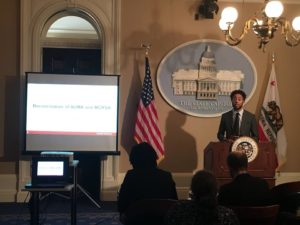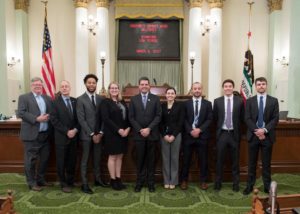
Getting it Right: Marijuana Policy in California
By Cameron A. Brown, Stanford Law School | Class of 2017
Marijuana has come a long way since the gloomy, back-alleys of Reefer Madness in 1936. Since Colorado first legalized marijuana for adult use in 2012, eight states have followed, with Canada today introducing a bill in Parliament to legalize and tax marijuana usage and sales according to regulations for alcohol. (See “Trudeau Unveils Bill Legalizing Recreational Marijuana in Canada,” New York Times, 4-13-17.) This rapid shift in cultural norms towards legal marijuana is causing legislators in affected localities to scramble to regulate markets, establish transport guidelines, oversee environmental impact, and set forth clear DUI rules. To help clarify conflicts and gaps in current regulations, a Stanford Law and Policy Lab research team worked directly with California Assemblyman Jim Wood (District 2) who represents the “Emerald Triangle”—the three counties that comprise the largest marijuana-producing region in the United States. Assemblyman Wood asked the SLS research team for help in examining the thorny legal issues involved in implementing California Proposition 64, which legalizes retail marijuana for adult recreational use.

Prop. 64 is the latest in California’s long debate over marijuana. In 1972, voters first considered decriminalizing marijuana with Prop. 19. Although that proposition failed, the California Legislature gradually enacted statutes favorable to marijuana. Those statutes helped pave the way for the groundbreaking Prop. 215, the Compassionate Use Act (1996), which established the nation’s first medical marijuana program. In response to the challenge of regulating medical marijuana, the California Legislature passed SB 420, which established statewide guidelines for medical marijuana use. These guidelines soon became the foundation for other states as they established their own medical marijuana programs.
Prop. 64 places California once again at the forefront of states facing challenges in implementing and regulating the new industry of marijuana. Although Colorado and Washington have laid the regulatory groundwork for legal cannabis, California faced a unique legal environment with the need to reconcile the new law with previous medical marijuana regulations. The Stanford Law and Policy Lab project “Legalizing Marijuana in California” stepped into this regulatory gray area to empirically analyze: (1) how to reconcile Prop. 64 with existing marijuana regulations; (2) appropriate DUI standards for drivers under the influence of marijuana; and (3) methods to prevent environmental damage from cannabis farming. The research findings indicate that the Legislature has the authority to enact legislation to aid in implementing and regulating the recreational marijuana industry. The research further examined how to develop an equitable, accurate, and efficient DUI standard for marijuana use, and prioritized regulatory options to enforce environmental sanctions on conspicuous abusers. After presenting the findings to Assemblyman Wood, the project team has now publicly released the findings in a white paper Implementing Prop. 64: Marijuana Policy in California. This report builds on earlier Policy Lab research in Legalizing Marijuana in California: A Review of Policy Considerations. The two reports offer an extensive policy framework that may help guide California law makers in navigating the thorny legal regime of marijuana markets and use, and they will serve as a resource to other states grappling with marijuana legalization. These policy reports now offer a policy toolkit to the growing delegation of lawmakers who represent states where marijuana is legal.
____________
Stanford Law School’s Law and Policy Labs provide students the opportunity to tackle real and substantial legal issues of statewide and national concern. The research team of law, medical, environmental systems, and public policy graduate students conducted research across disciplines, brainstormed solutions through a policy framework, crafted an extensive policy report, and presented findings at the California State Capitol in Sacramento this past March.

Rob MacCoun, Professor of Law, and Keith Humphreys, Professor of Psychiatry, directed the practicum, providing students with mentorship, guidance, and keen insights to further enrich the student-led research. The research team met weekly with the professors to discuss research design, the challenges of prioritizing feasible options, and coordinate the full white paper. The research teams also received guidance directly from the project client, Assemblyman Wood, in thinking through options most valuable to his district specifically and state regulators generally.
The team of Stanford Law and Policy Lab researchers: Rachael Apfel, Christopher Best, Cameron Brown, Benjamin Gloger, Michael Halper, Joshua Hedtke, George Hodgin, Heather Hughes, Michael Ohta, and Michael Yakima.
Upon graduation in June 2017, Cameron Brown will be working as an Associate in the Litigation Department of Paul, Weiss, Rifkind, Wharton, and Garrison in Washington D.C.
Leave a Comment